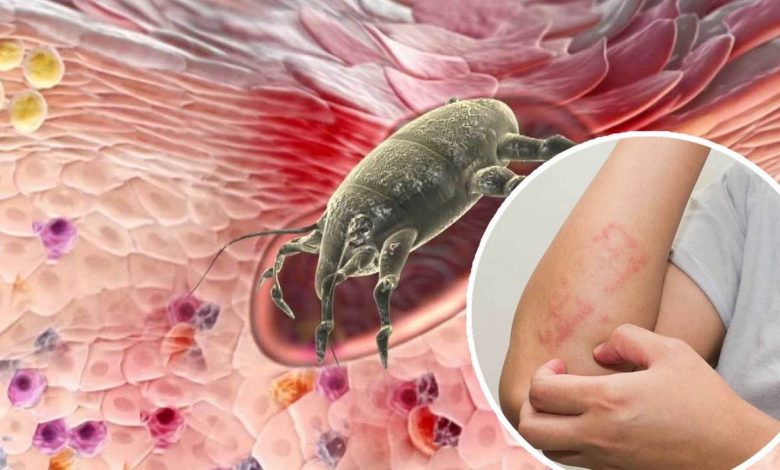Itching of the skin, prurigo, desire to itch: What's it, causes, symptoms, diagnostics, treatment, prevention

Itching
Itch, also known as pruritus, is a common condition, which can be caused by a number of factors. It is characterized by a feeling of irritation or discomfort on the skin., which can lead to scratching and further damage to the skin.
What is itching?
Itching is a feeling, arising from stimulation of the nerve endings of the skin. It can be described as a tingling or crawling sensation, and it may be accompanied by redness, swelling or rash.
Itching can occur anywhere on the body and can range from mild to severe.. It can be caused by various factors, including skin diseases, allergic reactions and comorbidities.
Causes of itching
There are many different factors, which can cause itching:
- Aging skin
- Atopic dermatitis (eczema)
- Contact dermatitis (poison ivy or poison oak)
- contact stimuli (eg, soap, chemicals or wool)
- Dry skin
- Hives
- Insect bites
- parasites, such as pinworms, body lice, head lice and pubic lice
- pink lichen
- Psoriasis
- Rash (may or may not itch)
- Seborrheic dermatitis
- Sunburn
- Superficial skin infections, such as folliculitis and impetigo
Itching can often be caused:
- Allergic reactions
- Children's infections (eg, chickenpox or measles )
- Hepatitis
- Zhelezodefitsitnaya anemia
- Kidney disease
- Liver disease with jaundice
- Pregnancy
- Reactions to drugs and substances, such as antibiotics (penicillin, sulfonamides), gold, griseofulvin, Isoniazid, Opiates, phenothiazines or vitamin A
Itching symptoms
The main symptom of itching is a feeling of irritation or discomfort on the skin.. This sensation may be accompanied by many other symptoms., depending on the underlying cause of itching. Common symptoms of itching include:
- Redness
- Edema
- Rash
- Bumps or blisters
- Dry, shelushashtayasya skin
- peeling skin
- Pain or skin sensitivity
When to see a doctor
If you experience severe or persistent itching, it is important to see a doctor. You should also see a doctor, if itching is accompanied by other symptoms, such as fever, chills or difficulty breathing.
In some cases, itching may be a sign of an underlying disease., which requires immediate treatment. A doctor can help diagnose the cause of your itching and recommend an appropriate course of treatment..
Questions, that your doctor may ask
During a physical examination for itching, your doctor may ask you a number of questions., to help diagnose the underlying cause. These questions may include:
- When did you get itchy?
- Where on your body does it itch?
- Have you changed your soap or laundry detergent recently??
- Have you been exposed to any new chemicals or irritants?
- Have you been diagnosed with any diseases, which can cause itching?
- Are you taking any medication, which can cause itching?
Itching diagnosis
Diagnosing the underlying cause of itching can be challenging, because there are many possible reasons. The doctor usually starts with a physical exam and asks about symptoms and medical history..
The doctor may also do blood tests or skin tests., to determine the cause of the itching. In some cases, a skin biopsy may be required., to obtain a small sample of skin tissue for laboratory analysis.
Treatment of pruritus
Treatment for itching depends on the underlying cause.. In many cases, over-the-counter creams or lotions can be effective in treating itching.. It could be antihistamines., corticosteroids or moisturizers.
If itching is caused by an underlying disease, the doctor may recommend medications or other treatments, to manage this disease and relieve your symptoms.
home treatment for itching
There are several home methods, which can relieve itching, including:
- Do not scratch or rub itchy areas. Cut your nails short, not to scratch the skin. Family members or friends can help, paying attention to your scratches
- Wear cool, lung, loose underwear. Don't wear rough clothes, eg, wool, on the itchy area
- Take a warm bath with a little soap and wash the itchy areas thoroughly. Try a soothing oatmeal or cornstarch bath
- Apply a soothing lotion after bathing, to soften and cool the skin
- Apply moisturizer to your skin, especially during the dry winter months. Dry skin is a common cause of itching
- Apply cold compresses to the itchy area
- Avoid prolonged exposure to excessive heat and humidity
- Do business, which will take your mind off the itch during the day and make you tired enough, to sleep at night
- Try OTC oral antihistamines, such as difengidramin (Benadryl). Be aware of possible side effects, such as drowsiness
- Try an over-the-counter hydrocortisone cream for itchy areas
Itching Prevention
To prevent itching, several steps can be taken, including:
- Skin hydration
- Avoid contact with irritants and allergens
- Using mild soaps and detergents
- Wearing loose, breathable clothing
- Using repellents to protect against insect bites
Conclusion
Itching is common, which can be caused by various factors. Although it may cause discomfort and irritation, it usually does not pose a serious medical problem. If you experience severe or persistent itching, it is important to contact a healthcare professional, who will help diagnose the underlying cause and recommend the appropriate course of treatment.
Used sources and literature
Dinulos JGH. Urticaria, angioedema, and pruritus. In: Dinulos JGH, ed. Habif’s Clinical Dermatology. 7th ed. Philadelphia, PA: Elsevier; 2021:chap 6.
Legacy FJ, Weisshaar E, Fleischer AB, Bernhard JD, Cropley TG. Pruritus and dysesthesia. In: Bolognia JL, Schaffer JV, Cerroni L, eds. Dermatology. Philadelphia, PA: Elsevier; 2018:chap 6.
